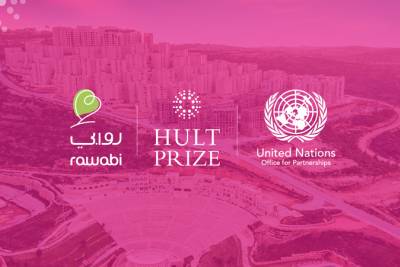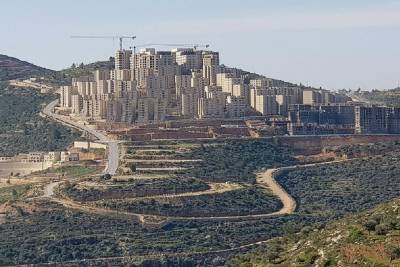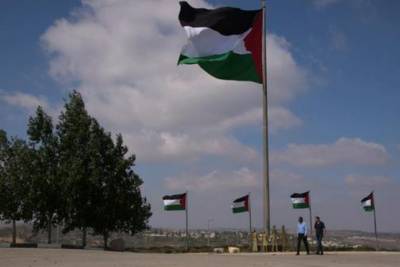New Palestinian metropolis rises in the West Bank as Israeli occupation turns 50
Standard.net - William Booth - Occupied: Year 50
Israel’s military occupation of the West Bank and Gaza began five decades ago, when Israel defeated three Arab armies. Today, millions of Palestinians still face concrete walls, checkpoints and other Israeli controls. What does it feel like to be “occupied” in 2017?
---
RAWABI, West Bank -- In the newest city in the wannabe state of Palestine, the developer Bashar Masri is putting the finishing touches on his mall. Not just any mall. “A shopping experience,” as luxe as any in Israel, with aspirational sneakers, designer handbags, all the international brands never available here before.
Upmarket consumer options might be ho-hum news in most of the world, but this isn’t any other place.
This is the occupied West Bank, a hornet’s nest of a home to 2.6 million Palestinians and brigades of Israeli soldiers and 400,000 Jewish settlers who have come to claim the land they say was awarded to them by history and God.
Rawabi is the first planned city in the West Bank built by Palestinians for Palestinians, a $1.4 billion metropolis constructed over the last nine years from bare rock.
The city is the most ambitious project in the Palestinian territories and today is the largest private-sector employer here.
Masri is billing his city on a hill as a revolutionary act, a raised fist with a wallet.
“We will live like normal people,” he said, “until the situation is normal.”
As the Israeli occupation of the West Bank turns 50 years old in June, Israel will celebrate the taking of Jerusalem in its near-miraculous Six-Day War against Arab armies led by Egypt, Syria and Jordan.
On the other side of 26-foot-tall concrete walls that surround Jerusalem, Palestinians will point to an occupation that now appears to be never-ending, with its levers of control ever present: the separation barriers, permit regimes, crowded checkpoints.
If Palestinians cannot get permission to spend their money in Israeli malls, Masri says, let them shop in Rawabi. That is how you build a state.
“And why not?” he said. “We’ve earned it.”
Rawabi is the counternarrative in the forever conflict in which Palestinians are often portrayed as terrorist or victim, living in refugee camps or dusty villages out of biblical times.
The Palestinians Masri has in mind? All the upwardly mobile dentists, Web designers and middle managers who don’t make the news.
The half-built city of Rawabi has been a media darling for years, a tour-bus destination for visiting Norwegian diplomats, Harvard Business School scholars, Arab venture capitalists, adventuresome American Jews, and most recently Coldplay - because nothing like this has been tried here before.
This is what a new Palestinian state could look like, says Masri, a metropolis with a 15,000-seat Roman-style amphitheater, hosting Broadway shows like “Cats,” with Palestinian techies typing code for Israeli companies and children learning crisp diction in the British-style Rawabi English Academy.
Masri believes that if he offers his people Zumba classes, they will come.
Or it could all fall apart.
Shopping for a new normal
The grand opening of Rawabi’s “Q Center” - named after the city’s Qatari backers - is just days away at the end of May, and the open-air promenade was swarming with Palestinian construction crews. Sparks were flying in the night air. Workers going round the clock, hanging signs, stocking shelves. Masri was a blur of motion, barking at the engineers trailing behind with clipboards and walkie-talkies.
Details, people! Masri was jabbing his finger left and right. Look, paver stones are loose. Sconce lights all wrong. And those geraniums look dead. Fix it. Move it. Finish it.
If his mall succeeds, Masri told me, if his business center succeeds, there is commerce, there are jobs and people.
Masri also said Rawabi could collapse if the Israeli military government, which runs most of the West Bank, decides to turn off the water or electricity, again. The Israelis could shut down the access roads, too. They’ve done it before.
Masri opened his laptop to show me a photo sent by a resident the day before. There were four Israeli soldiers and a jeep pulled across Rawabi’s main entrance road, a “flying checkpoint,” temporary but ominous to Palestinians, who are forced to show IDs, open their trunks and explain themselves - just to get home.
The Israel Defense Forces say they routinely erect such checkpoints to search for weapons, suspects and contraband.
“Two, three, four weeks of this? One jeep with Israeli teenagers in uniform? That will kill us,” Masri said.
Rawabi could also fail if Palestinians decide they don’t want what Masri is selling.
The Palestinian multimillionaire and his Qatari partners are doing all this to make money, for sure.
But they also say let the women of Rawabi jog, with or without veils or fear of social censure. And give the residents speed bumps, yoga classes and the first and only homeowner’s association in the West Bank.
Masri said the often invisible Palestinian middle class deserves the $125,000, three-bedroom apartments in Rawabi, for sale now at 4.95 percent mortgage rates, next to a mall stocked with real Wrangler Advanced Comfort Relaxed Fit Jeans, not the counterfeits you find in the bazaars of Ramallah.
If Rawabi thrives? Masri envisions many more Rawabis.
Successive American presidents struggled and failed to make a permanent peace between Israel and the Palestinians.
Donald Trump, the real estate tycoon with the global brand who became president, has said he wants to try again, to strike “the toughest deal in the world.”
Maybe Trump should hear the struggles of Bashar Masri. Because at its core, the Israel-Palestine conflict is nothing if not a real estate story.
The former U.S. ambassador to Israel, Daniel Shapiro, said if Trump wants to see one piece of the puzzle, he should come to Rawabi.
The two developers would have something to talk about.
‘Maybe too quiet?‘
As the Israeli occupation begins its sixth decade, what does it feel like, not just to the Palestinian laborer negotiating with an Israeli soldier at a checkpoint - but a Palestinian master of the universe like Masri, who commutes in private jets and hosted the former U.N. secretary general for lunch at Rawabi?
“I hate the occupation,” Masri said. “It’s evil.”
When he was a teenager, Masri shot the finger at Israeli soldiers. Now he is one of the richest men in the Palestinian territories.
When he was young, he went to the United States, got his degree in chemical engineering at Virginia Tech, married an American, had two daughters, and was awarded U.S. citizenship.
“I love America,” Masri said.
But he came home to the West Bank in the 1990s.
“I dreamed there would be a Palestinian state,” he said.
He thought everyone would come home to build it.
“But honestly there weren’t many,” he said.
The master plan for Rawabi calls for 8,000 homes and a population of 40,000 on the hilltop, surrounded by areas that today are under partial or complete control - civil or security - of the Israeli military.
If completed, Rawabi will be bigger than all but a handful of the 126 Jewish settlements in the West Bank - communities that are branded illegal by most of the world, although Israel disputes this.
Masri says his apartments are selling briskly and that 3,000 people live in Rawabi today.
But during my visits, his city felt empty to me - hopeful but lonesome.
Only three of the neighborhoods are finished, and construction is ongoing. In the evenings I walked around the terraced blocks and counted cars in parking lots and lights on in the living rooms. There weren’t many.
I met Jihad Kmail and his wife, Israa Sarsour, a young married couple, both architects, with a toddler. They moved here from Ramallah, where prices for new apartments are even higher.
They said they liked the modernity, safety and order of Rawabi. They believe in their investment.
“But we don’t know whether Rawabi will succeed or not,” Sarsour said. They were hopeful but nervous. “It’s nice. But maybe too quiet?”
In the days before Masri’s mall opens, the whole project feels as tentative as the Palestinian dream for a state.
“The occupation is not designed to make Palestinians successful,” Masri said.
He was driving his jeep toward the mall, mumbling about why the mosque was taking so long.
Risk is written all over the project. It’s not just the Israelis.
The Palestinians could launch another uprising. Palestinian youth, goosed by incitement on Facebook, personal trauma, mental illness, dreams of paradise or nationalist fervor, could start stabbing and ramming their family cars into Jews again - or Hamas cells could kidnap Israeli teens, as they did in the summer of 2014, which sparked the last of three Gaza wars.
Violence almost derailed Rawabi before.
It is tough to market high-end apartments to Palestinians during Gaza wars or prisoner hunger strikes or “days of rage” declared by the Palestinian Authority.
It is also possible that the Palestinians will not embrace Masri’s vision of a Western-style middle-class utopia.
Maybe they really don’t want equestrian centers or Hugo Boss or a wine cave.
The seeds of ambition
Masri works out of a small mobile home at the edge of the construction site. Outside the window, he can watch the minaret of Rawabi’s new mosque rise toward the heavens.
He has also set aside land for a Christian church.
Masri wants Rawabi to be 10 percent Palestinian Christian.
He has a desk barely big enough to hold a laptop. For lunch, he picked at a plate of lettuce leaves and asked, “Where do you want me to begin?”
He was born and raised in nearby Nablus, an ancient city with crumbling palaces, a famous bazaar and a reputation for resistance. His father was a successful physician.
“A well-off family,” Masri said.
When he was a teenager in the 1970s, Masri participated in violent demonstrations against the Israelis. He was a youth organizer, burnished by arrest and jail by age 15.
“The Israeli soldiers beat the crap out of me,” he said.
In prison, the old men in the Palestine Liberation Organization taught him Marx and Lenin.
“I was a revolutionary,” he said. “I thought capitalism was the ultimate evil.”
He sees the irony, of course. This is why he is telling the anecdote.
As a young man, he also served as an aide to Yasser Arafat. When Arafat’s plane landed at Andrews Air Force Base in 2000, a visit that would end with the collapse of the Camp David peace talks, Masri said he was the Palestinian who opened the jet’s door.
Hunt for land and cash
“Who else is crazy enough to build a city?”
Masri is pedaling his exercise bicycle and holding forth.
Masri said he made a fortune building low-income housing in Morocco and made serious cash with projects in Libya, Egypt and Jordan.
He found enough land for his city near the Palestinian de facto capital in Ramallah, but Masri said a sympathetic Israeli military official told him it would never be approved, ever, because it was too close to Ofra, one of the West Bank’s first Jewish settlements, whose members have deep connections to the Israeli establishment.
“So okay, I thought, let’s go pick on a settlement more my own size,” Masri said.
An old friend showed Masri the hilltop that would become Rawabi. “I fell in love,” he said, with its panorama across a pastoral landscape of terraced valleys, dotted by Palestinian villages and Israeli settlements and, far off a blue smudge, the Mediterranean Sea.
Not exactly waterfront, but a view he could sell.
There were thousands of owners of the land, heirs of plots dating from the Ottoman era, subdivided over generations, many living abroad in the Palestinian diaspora.
This is the only part of his narrative where Masri expresses remorse. He and the Palestinian Authority employed eminent domain for some properties, allowing them to seize land and pay for it.
There’s still bad blood in the surrounding Palestinian villages.
Masri also needed money, too. A lot.
He went on the road, taking 73 meetings before he struck gold with the Qatari Diar Real Estate Investment Company. It put up two-thirds of the money. “It was the luckiest day of my career,” Masri said.
With land and money, Masri needed a road to the site to do the excavation work that would take six years. The road to Rawabi goes through Area C, the 60 percent of the West Bank where the Israeli military has complete control - not just security but building permits.
It took four years to get permission from the Israelis to pave the road. Today it is barely wide enough for two cars to pass, a country lane through a vineyard.
Getting water was harder. The Israelis refused to provide Rawabi with water because the Palestinian Authority refused to participate in a Joint Water Committee, which approved water for Palestinian villages and Jewish settlements.
Masri said Rawabi was about to collect $120 million for apartments that were sold, but 452 of the 639 buyers canceled their deals when Israel balked on water.
Solving the water problem took 18 months and was raised in the White House, according to Masri, not once, but twice in meetings between President Barack Obama and Israel’s prime minister, Benjamin Netanyahu.
“We’re famous,” Masri said. “But not the way we want to be.”
One of Rawabi’s engineers is Shadia Jaradat, 29, and on a recent afternoon, she showed her top-floor apartment off to a visiting Harvard professor and his kids.
“We deserve this lifestyle,” she told me. “We don’t need everyone to love it, but don’t deny it to others who want it.”
Across the street, the construction crews were hammering out the finishing touches on the mall with 28 stores and dozens of international brands, with cinemas, nightclubs and cafes to come.
“I always believe we will make it,” Jaradat said.
“If I don’t believe, even for a minute, I will lose all my energy,” she said. “So I believe.”
To view original article, Click Here.



